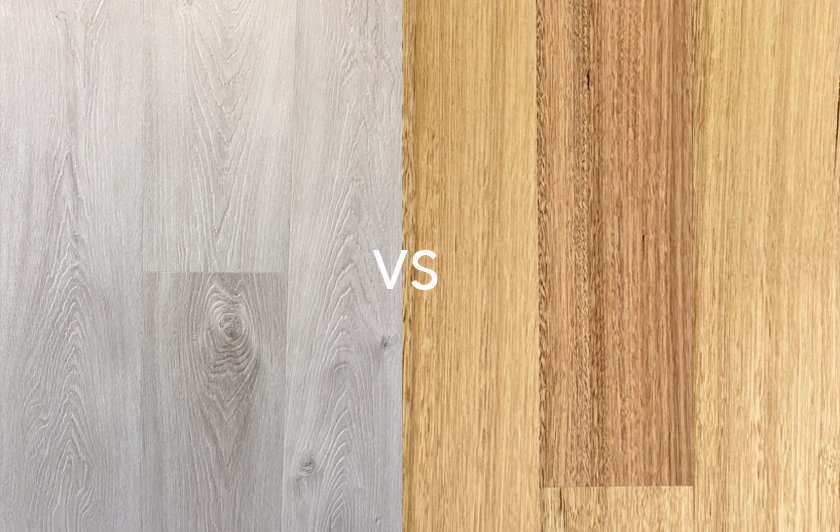When renovating or building a home, choosing the right flooring can feel overwhelming. With so many styles, finishes, and materials available, it’s important to understand the differences between the main options. Timber, laminate, hybrid, and vinyl flooring each bring unique benefits, but they also come with certain limitations. This guide breaks down the essentials to help you decide which is right for your space.
Timber Flooring
Timber flooring is made from solid natural wood, giving it a timeless and authentic feel. Known for its elegance and long lifespan, timber floors can be sanded and polished multiple times to refresh their look.
Pros:
- Premium look and feel.
- Adds value to your property.
- Extremely durable when maintained.
Cons:
- More expensive than other flooring options.
- Requires regular maintenance to prevent scratches and water damage.
- Not ideal for wet areas such as bathrooms or laundries.
Laminate Flooring
Laminate flooring is made with a high-density fibreboard (HDF) core and a photographic top layer designed to mimic natural timber. It is an affordable alternative for homeowners who want the look of wood without the cost.
Pros:
- Budget-friendly.
- Wide range of styles and colours.
- Scratch-resistant surface.
Cons:
- Not waterproof.
- Cannot be sanded or refinished.
- Less durable compared to solid timber.
Hybrid Flooring
Hybrid flooring combines the best elements of laminate and vinyl, featuring a rigid core that makes it strong, stable, and completely waterproof. It has quickly become one of the most popular choices in modern homes.
Pros:
- 100% waterproof, suitable for kitchens, bathrooms, and laundries.
- Highly durable and resistant to scratches and dents.
- Easy installation, often with a click-lock system.
- Great for busy households with kids or pets.
Cons:
- Premium ranges can be more expensive.
- Doesn’t always have the same natural warmth underfoot as timber.
For homeowners weighing up practical and stylish flooring options, hybrid has become a leading choice in flooring Sydney thanks to its resilience and versatility.
Vinyl Flooring
Vinyl flooring is made from PVC and comes in sheets, planks, or tiles. It’s valued for its water resistance, low cost, and soft feel underfoot.
Pros:
- Waterproof and ideal for high-moisture areas.
- Comfortable to walk on and absorbs sound.
- Affordable and easy to clean.
Cons:
- Can dent under heavy furniture.
- May fade when exposed to strong UV light.
- Not as long-lasting as timber.
Which Flooring is Best for Your Home?
The best choice depends on your lifestyle, budget, and the specific room you’re upgrading. For premium elegance, timber is unbeatable. Laminate offers style at a lower price. Hybrid provides the perfect balance of durability, water resistance, and easy care, while vinyl is affordable and ideal for areas prone to moisture.
In Closing
Understanding the differences between timber, laminate, hybrid, and vinyl flooring makes it easier to choose the right option for your home. Each has its strengths, and the best fit will depend on your priorities. With the right choice, you’ll enjoy both functionality and style in your living spaces.
